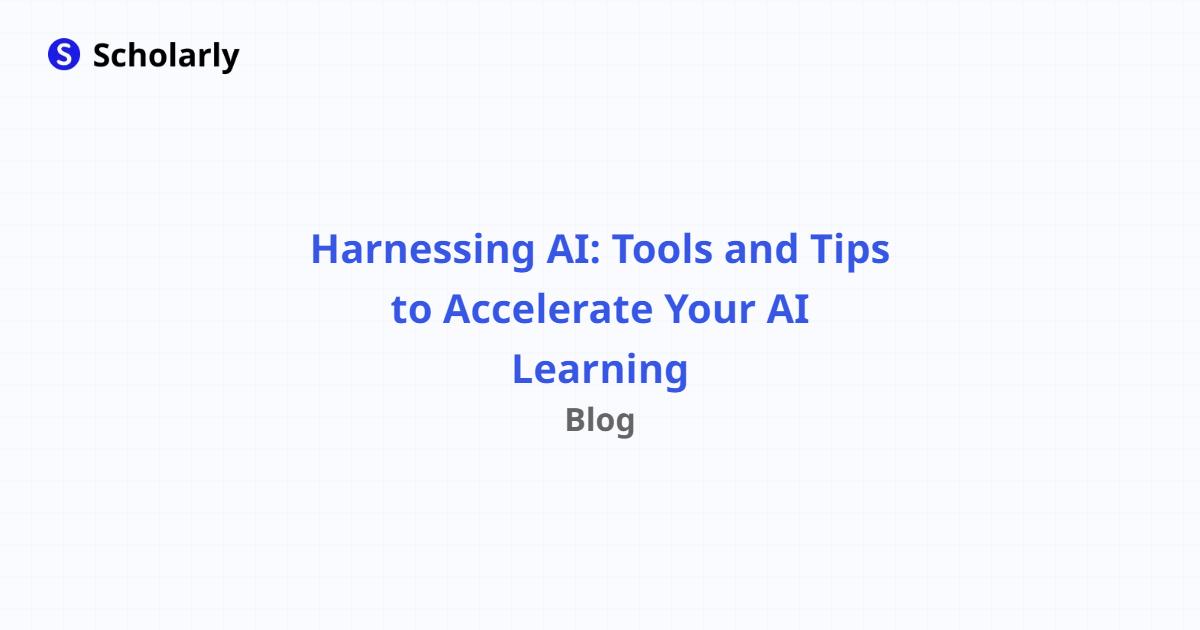Published in General
Revolutionizing the Way We Work with AI Assistants
By Scholarly
14 min read
Introduction
In today's rapidly changing world, technology continues to advance at an unprecedented pace. One such advancement is the rise of AI assistants, which are transforming our daily lives and revolutionizing the way we work. From voice-activated virtual assistants like Amazon's Alexa and Apple's Siri to intelligent chatbots and productivity-enhancing tools, AI assistants have become an integral part of our personal and professional lives.
In this blog post, we will delve into the history, benefits, significance, best practices, and challenges of AI assistants. We will also explore some of the popular AI-powered assistant tools available today.
History
Past State
AI assistants have a rich history that dates back several decades. The concept of having an intelligent assistant to perform tasks on our behalf has long been a part of science fiction. However, it wasn't until recent years that significant advancements in AI technology made it possible to bring these assistants to life.
In the past, AI assistants were limited in their capabilities. Early versions of virtual assistants were primarily focused on voice recognition and basic tasks like weather updates and web searches. They lacked the ability to understand natural language, context, and provide personalized assistance.
Current State
Fast forward to the present day, and AI assistants have come a long way. Thanks to advancements in machine learning, natural language processing, and voice recognition, modern AI assistants are more intelligent and capable than ever before.
Leading technology companies such as Amazon, Apple, Google, and Microsoft have developed their own AI assistant platforms, each with its unique features and capabilities. These assistants can perform a wide range of functions, from answering questions and setting reminders to controlling smart home devices and playing music.
Furthermore, AI assistants have expanded beyond traditional voice-activated devices. Chatbots, which are AI-powered conversational agents, are increasingly being utilized by businesses to provide customer support and streamline interactions. These chatbots are designed to understand and respond to human queries, providing instant assistance and improving customer satisfaction.
Future State
The future of AI assistants holds great promise. As AI technology continues to advance, we can expect AI assistants to become even more intelligent and capable. They will likely gain deeper contextual understanding and offer more personalized assistance.
In the future, AI assistants may extend beyond our personal devices and seamlessly integrate into our daily lives. Imagine a world where AI assistants are integrated into our cars, homes, and workplaces, proactively anticipating our needs and providing personalized recommendations and assistance.
Furthermore, AI assistants are poised to become increasingly collaborative. They will not only assist us but also work alongside us as intelligent teammates, helping us navigate complex tasks, analyze data, and make informed decisions.
AI assistants will also play a crucial role in industries such as healthcare, finance, and education. They will help healthcare professionals diagnose illnesses, automate financial processes, and provide personalized tutoring and educational resources to students.
Benefits
AI assistants offer a wide range of benefits that enhance our productivity, efficiency, and overall quality of life. Let's explore some of these benefits:
Time-Saving: AI assistants can handle mundane tasks and automate repetitive processes, freeing up our time to focus on more meaningful and complex work.
Increased Productivity: With AI assistants, we can streamline our workflows, access information instantly, and multitask more effectively, leading to increased productivity.
Personalization: AI assistants can learn from our preferences, habits, and behavior to provide personalized recommendations and assistance tailored to our individual needs.
Convenience: AI assistants are always available and accessible, allowing us to get information, perform tasks, and seek assistance at any time and from anywhere.
Improved Decision-Making: AI assistants can analyze large volumes of data, identify patterns, and provide insights to support informed decision-making.
Significance
The significance of AI assistants cannot be overstated. These intelligent virtual assistants have the potential to revolutionize the way we work and interact with technology.
Enhanced Efficiency: AI assistants streamline our workflows and automate tasks, allowing us to accomplish more in less time. By offloading repetitive and time-consuming tasks to AI assistants, we can focus on higher-level cognitive activities that require human creativity and critical thinking.
Improved User Experience: With their natural language processing capabilities, AI assistants provide a seamless and intuitive user experience. Whether it's voice commands or text-based interactions, AI assistants make technology more accessible and user-friendly.
Increased Accessibility: AI assistants cater to individuals with disabilities by providing alternative interaction methods. By supporting voice commands and spoken responses, AI assistants empower those with visual impairments or physical limitations to access and use technology.
Automation and Integration: AI assistants facilitate the automation and integration of various tasks and systems. They can interact with other software applications, devices, and platforms, enabling seamless integration and efficient communication.
Data Insights: AI assistants have the ability to analyze large volumes of data, extract meaningful insights, and present them in a digestible format. This data-driven approach allows businesses to make data-informed decisions and gain a competitive edge.
Best Practices
To make the most out of AI assistants, it is important to follow certain best practices:
Choose the right AI assistant: Not all AI assistants are created equal. Consider your specific needs, preferences, and the tasks you want the assistant to perform. Research and compare different AI assistant platforms to find the one that aligns with your requirements.
Understand the capabilities: Familiarize yourself with the capabilities and limitations of your chosen AI assistant. Each assistant has its own set of features and functions. Knowing what your assistant can and cannot do will help you maximize its utility.
Provide clear instructions: When interacting with your AI assistant, be clear and specific in your instructions. Avoid ambiguous or vague commands that might lead to misunderstandings. The more precise and explicit you are, the better the assistant will be able to assist you.
Regularly update and maintain: Keep your AI assistant up-to-date by installing regular software updates. These updates often include bug fixes, performance enhancements, and new features that can improve the assistant's functionality.
Protect your privacy: AI assistants often collect and process personal data to provide personalized assistance. Take steps to protect your privacy by reviewing privacy settings, understanding what data is being collected, and being mindful of the information you share.
Pros and Cons
AI assistants come with their own set of pros and cons. Let's take a look at some of these:
Pros:
Convenience: AI assistants make it easy to perform tasks and access information using natural language interactions.
Efficiency: AI assistants streamline workflows and automate tasks, saving time and increasing productivity.
Personalization: AI assistants can learn from user preferences and behavior to provide personalized recommendations and assistance.
Accessibility: AI assistants cater to individuals with disabilities by providing alternative interaction methods.
Integration: AI assistants can integrate with other software applications, devices, and platforms, enabling seamless functionality.
Cons:
Privacy Concerns: AI assistants collect and process personal data, raising privacy concerns. Users should be cautious about what information they share and review privacy settings.
Reliance on Technology: Over-reliance on AI assistants may lead to a loss of essential skills or the ability to perform tasks independently.
Accuracy and Limitations: AI assistants may still have limitations in understanding complex queries or performing certain tasks accurately.
Dependency and Impersonality: Constant reliance on AI assistants may lead to a diminishing sense of human connection and social interaction.
Ethical Considerations: As AI assistants become more intelligent and capable, ethical considerations arise regarding the use of personal data, privacy, and potential biases.
Comparison
There are several popular AI-powered assistant tools available today. Let's take a look at a few of them:
Amazon Alexa: Amazon's AI assistant, Alexa, is a voice-activated virtual assistant that can perform a wide range of tasks, from answering questions and playing music to controlling smart home devices.
Apple Siri: Siri is Apple's voice-controlled personal assistant. It can perform tasks such as setting reminders, sending messages, and making calls.
Google Assistant: Google Assistant is a virtual assistant available on Android devices and Google Home devices. It can provide information, answer questions, and perform various tasks.
Microsoft Cortana: Cortana is Microsoft's AI assistant, available on Windows devices. It can perform tasks like setting reminders, managing calendars, and providing personalized recommendations.
IBM Watson Assistant: Watson Assistant is an AI-powered assistant platform that allows businesses to build and deploy virtual assistants to interact with customers and provide personalized assistance.
Methods
Method 1: Voice-Activated AI Assistant
Description
The voice-activated AI assistant method utilizes natural language processing and voice recognition technology to interact with the assistant through voice commands.
Steps
- Activate your voice-activated AI assistant by saying the wake word or pressing a designated button.
- Speak clearly and provide specific instructions or ask questions to the AI assistant.
- The AI assistant will process your voice command, analyze it, and provide the requested information or perform the requested task.
Method 2: Chatbot AI Assistant
Description
The chatbot AI assistant method utilizes chatbot technology to interact with the assistant through text-based conversations.
Steps
- Access the chatbot AI assistant through a website, messaging platform, or dedicated app.
- Type your query or provide specific instructions in the chatbot interface.
- The AI assistant will analyze your input, understand your query or instructions, and provide a response or perform the requested task.
AI Impact
AI assistants have had a profound impact on various industries and aspects of our lives. Let's explore some of the key AI applications, techniques, benefits, challenges, and potential online apps that relate to AI assistants:
AI Applications
- Customer Support: AI assistants are increasingly being used as chatbots to provide instant and personalized customer support.
- Smart Home Automation: AI assistants can control and manage various smart home devices, enhancing convenience and energy efficiency.
- Virtual Personal Assistants: AI assistants act as virtual personal assistants, helping users with tasks such as scheduling appointments, managing calendars, and setting reminders.
AI Techniques
- Natural Language Processing: AI assistants utilize natural language processing techniques to analyze and understand human language.
- Machine Learning: AI assistants leverage machine learning algorithms to learn and improve over time, adapting to user preferences and behavior.
- Voice Recognition: Voice-activated AI assistants rely on voice recognition technology to understand and respond to verbal commands.
AI Benefits
- Personalization: AI assistants provide personalized recommendations and assistance based on user preferences and behavior.
- Automation: AI assistants automate tasks, saving time and reducing manual effort.
- Efficiency: AI assistants streamline workflows and improve productivity by handling mundane tasks.
AI Challenges
- Privacy and Security: AI assistants raise concerns about data privacy and security, as they collect and process personal information.
- Ethical Considerations: The use of AI assistants raises ethical considerations, such as biases in AI algorithms and the responsible handling of user data.
- Accuracy and Limitations: AI assistants may have limitations in understanding complex queries or performing certain tasks accurately.
Potential Online Apps that Relate to AI Assistants
- Replika: Replika is an AI-powered chatbot that acts as a personal AI friend, offering conversation and emotional support.
- x.ai: x.ai is an AI-powered personal assistant that helps schedule meetings and manage calendars.
- Grammarly: Grammarly utilizes AI technology to provide real-time grammar and spelling suggestions while writing.
- RescueTime: RescueTime is a time management tool that uses AI to track and analyze how users spend their time and offers productivity insights and suggestions.
- Clara: Clara is an AI-powered meeting scheduling assistant that handles the back-and-forth communication of finding the best meeting time.
Conclusion
The rise of AI assistants has revolutionized the way we work and interact with technology. From voice-activated virtual assistants like Amazon's Alexa and Apple's Siri to intelligent chatbots, AI assistants have become an indispensable part of our personal and professional lives.
In this blog post, we explored the history, benefits, significance, best practices, and challenges of AI assistants. We also discussed popular AI-powered assistant tools and the impact of AI on various industries. As AI technology continues to advance, we can expect AI assistants to become even more intelligent, collaborative, and integrated into our daily lives. Embracing AI assistants and leveraging their capabilities will empower us to work more efficiently, make informed decisions, and enhance our overall productivity and well-being.
Now, it's time to embrace the future of work with AI assistants by our side, simplifying tasks, and empowering us to achieve more than ever before!




